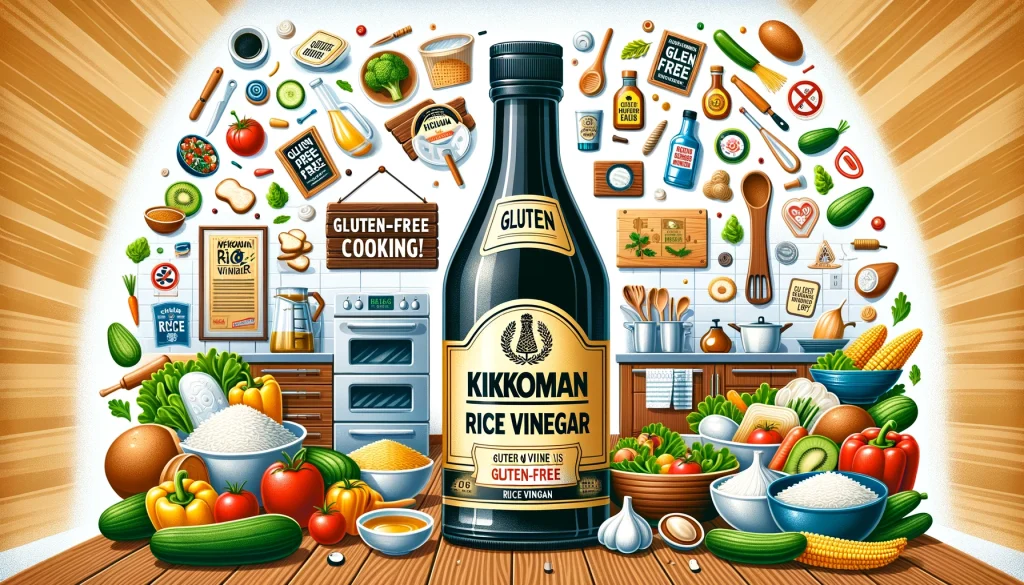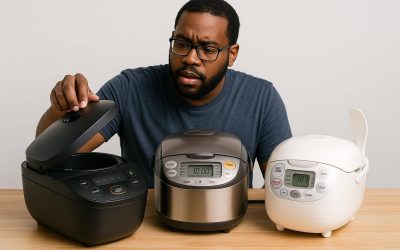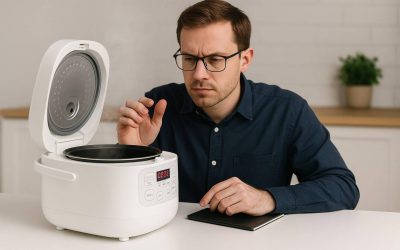As an Amazon Associate I earn from qualifying purchases.
In the ever-evolving landscape of dietary needs and preferences, gluten-free options have become a staple requirement for many individuals. Among the myriad of ingredients that populate our kitchens, vinegar stands out as a versatile component, essential in various culinary creations. Rice vinegar, in particular, is celebrated for its mild flavor and suitability in a range of dishes, from salads to sushi. A leading name in this category is Kikkoman, a brand synonymous with quality and tradition in soy sauce and vinegar production. However, for those navigating the complexities of a gluten-free diet, the question arises: Is Kikkoman Rice Vinegar gluten-free?
This article delves into the gluten-free status of Kikkoman Rice Vinegar, providing clarity and guidance for those with celiac disease, gluten sensitivity, or anyone following a gluten-free lifestyle. Understanding the importance of safe dietary options, we explore the production processes, labeling practices, and any potential cross-contamination risks associated with this popular vinegar. Our goal is to equip you with the knowledge needed to make informed decisions about including Kikkoman Rice Vinegar in your gluten-free diet, ensuring that you can enjoy the flavors you love without compromising your health and well-being. Join us as we uncover the facts behind Kikkoman Rice Vinegar and its place in a gluten-free kitchen.
Is Kikkoman Rice Vinegar Gluten Free?

Yes, Kikkoman Rice Vinegar is gluten-free. It is made from rice and water, ingredients that do not contain gluten. Kikkoman ensures that its rice vinegar meets the requirements to be considered gluten-free, making it suitable for those with gluten sensitivities or celiac disease. However, it’s always a good practice to check the product label or the manufacturer’s website for the most current information, especially for individuals with severe allergies or intolerances, as formulations and production facilities can change.
For those who need to follow a strict gluten-free diet, understanding the nuances of food labeling and manufacturing practices is crucial. While Kikkoman Rice Vinegar is inherently gluten-free due to its rice and water composition, cross-contamination is a risk factor in facilities that process products containing wheat, barley, or rye. Kikkoman takes measures to prevent cross-contamination, but it’s always wise to look for products specifically labeled as gluten-free, as this indicates adherence to regulatory standards for gluten content.
Additionally, Kikkoman offers a variety of products, some of which may contain gluten. For example, their seasoned rice vinegars and certain sauces might have ingredients derived from wheat, which is not gluten-free. Therefore, if you’re specifically interested in Kikkoman Rice Vinegar for its gluten-free qualities, make sure you’re selecting the pure rice vinegar variety and not a seasoned version unless it is clearly labeled as gluten-free.
If you have celiac disease or non-celiac gluten sensitivity, consider these precautions:
- Check Labels Carefully: Even if a product is traditionally gluten-free, always read the labels for any mention of gluten-containing ingredients or advisory statements regarding shared production lines.
- Look for Certification: Products certified gluten-free have been tested to meet strict gluten-free standards. This can provide an extra layer of reassurance.
- Consult the Manufacturer: If in doubt, contact the manufacturer directly to inquire about their production practices and potential risk of cross-contamination.
Kikkoman is committed to providing high-quality products that can be enjoyed by as many people as possible, including those on gluten-free diets. By taking the time to ensure that your selections are safe for your dietary needs, you can enjoy the distinctive, mild flavor of Kikkoman Rice Vinegar in your cooking without concern.
Expert Tips
When navigating gluten-free options, especially with products like Kikkoman Rice Vinegar, it’s essential to consider expert tips to ensure safety and maintain a gluten-free diet effectively. Here are some expert tips specifically tailored to understanding and verifying the gluten-free status of Kikkoman Rice Vinegar and similar products:
1. Understand Labeling Laws
- Countries have different regulations for labeling gluten-free products. Familiarize yourself with the laws in your region to better understand what the gluten-free label guarantees.
2. Check for Gluten-Free Certification
- Look for official gluten-free certification marks on the packaging. These certifications indicate that the product has undergone rigorous testing to meet strict gluten-free standards, providing an added layer of trust.
3. Read Ingredient Lists Carefully
- Even if a product is labeled as gluten-free, always read the ingredient list for potential sources of gluten or cross-contamination warnings. Ingredients can change, so it’s a good practice to check every time you purchase a product.
4. Be Aware of Cross-Contamination Risks
- Inquire about the manufacturing process if possible. Products like rice vinegar could be produced in facilities that also process wheat or other gluten-containing grains, posing a risk for cross-contamination.
5. Contact the Manufacturer
- If you have any doubts or need clarification, don’t hesitate to reach out to the manufacturer directly. They can provide detailed information about their production processes and how they ensure their products remain gluten-free.
6. Stay Updated
- Manufacturers may change their recipes or production methods, which can affect the gluten-free status of a product. Follow brands on social media, check their websites regularly, and subscribe to newsletters for the latest information.
7. Educate Yourself on Hidden Sources of Gluten
- Become knowledgeable about ingredients that may contain hidden sources of gluten. While vinegar is generally gluten-free, other additives or flavorings in some products might not be.
8. Use Gluten-Free Community Resources
- Online forums, blogs, and support groups for those with celiac disease or gluten sensitivities can be excellent resources for recommendations and alerts about changes in product formulations.
9. When in Doubt, Go Without
- If you cannot verify a product’s gluten-free status to your satisfaction, it’s safer to avoid it. There are many alternative products and brands with clear gluten-free labeling and certification.
By following these expert tips, individuals on a gluten-free diet can confidently incorporate products like Kikkoman Rice Vinegar into their meals, ensuring they enjoy the flavors they love without compromising their health and well-being.
Frequently Asked Questions (FAQ)
Addressing expertise questions regarding the gluten-free status of Kikkoman Rice Vinegar can provide clarity and assurance for those needing to adhere to a strict gluten-free diet. Let’s delve into some potential questions and answers on this topic.
Q: Is Kikkoman Rice Vinegar gluten-free?
A: Yes, Kikkoman Rice Vinegar is made from rice and water, which are naturally gluten-free ingredients. It is safe for individuals following a gluten-free diet.
Q: Can I use Kikkoman Rice Vinegar in gluten-free recipes?
A: Absolutely. Kikkoman Rice Vinegar is suitable for gluten-free cooking and can be used in a variety of recipes, from dressings and marinades to sushi rice.
Q: Is there a risk of cross-contamination with gluten in Kikkoman Rice Vinegar?
A: Kikkoman takes measures to prevent cross-contamination, but those with severe gluten sensitivities should always check the product label for any gluten-free certifications or statements regarding manufacturing practices to ensure safety according to their personal health needs.
Q: Does Kikkoman offer a seasoned rice vinegar, and is it also gluten-free?
A: Kikkoman does offer seasoned rice vinegar, which contains additional ingredients like sugar and salt. However, seasoned varieties may sometimes contain ingredients that are not gluten-free, so it’s important to read the label carefully. Look for a gluten-free label or statement if you’re sensitive to gluten.
Q: How do I know if a vinegar product is truly gluten-free?
A: Look for products that are labeled as gluten-free. These have been tested and confirmed to meet the regulatory standards for gluten-free labeling. For additional assurance, check for gluten-free certifications from reputable organizations.
Q: Where can I find gluten-free Kikkoman Rice Vinegar?
A: Gluten-free Kikkoman Rice Vinegar can be found in most supermarkets, health food stores, and online retailers. It’s often located in the Asian or vinegar section. Make sure to check the label for a gluten-free statement.
Q: Are there any Kikkoman products I should avoid if I’m avoiding gluten?
A: While Kikkoman Rice Vinegar is gluten-free, some Kikkoman products, like certain soy sauces and marinades, may contain gluten. Always read labels carefully, and opt for products specifically marked as gluten-free when necessary.
Q: How does Kikkoman ensure its rice vinegar is gluten-free, and what standards do they follow?
A: Kikkoman adheres to strict production and quality control processes to ensure its rice vinegar maintains a gluten-free status. This includes sourcing gluten-free ingredients (rice and water), utilizing dedicated equipment or thorough cleaning protocols to minimize the risk of cross-contamination, and conducting regular testing for gluten presence. The standards followed are typically aligned with the regulatory requirements of the countries where the products are sold, such as the FDA in the United States, which requires gluten-free labeled products to contain less than 20 parts per million (ppm) of gluten.
Q: Can rice vinegar become contaminated with gluten during the manufacturing process?
A: While rice vinegar itself is naturally gluten-free, cross-contamination is a potential concern in facilities that also process gluten-containing products. Kikkoman takes measures to prevent this, such as segregating gluten-free ingredients from gluten-containing products and ensuring thorough cleaning of equipment. Consumers with severe gluten intolerances should look for products specifically labeled as gluten-free, indicating adherence to stricter safety standards.
Q: Is there a difference in gluten content between Kikkoman’s seasoned and unseasoned rice vinegar?
A: Yes, there can be a significant difference. Kikkoman’s unseasoned rice vinegar is naturally gluten-free, being made from rice and water. However, seasoned rice vinegar often includes additional ingredients, such as sugar and salt, and sometimes soy sauce, which may contain gluten. It’s crucial to read labels carefully; if you’re gluten-sensitive, opt for the unseasoned variety unless the seasoned version explicitly states it is gluten-free.
Q: Are there any certification bodies that verify the gluten-free status of products like Kikkoman Rice Vinegar?
A: Yes, there are several certification organizations globally that verify the gluten-free status of products, such as the Gluten-Free Certification Organization (GFCO) in the United States, which requires products to meet stringent standards of less than 10 ppm of gluten. While not all Kikkoman products may carry such certifications, looking for the gluten-free certification logo is a good practice when purchasing any gluten-free product.
Q: What steps should consumers take if they are unsure about the gluten-free status of Kikkoman Rice Vinegar?
A: If consumers are unsure, they should:
Check the product label for a gluten-free claim and ingredient list.
Visit the manufacturer’s website or contact them directly for detailed product information and assurances regarding their gluten-free standards and testing protocols.
Consult with healthcare professionals or dietitians specialized in gluten-free diets for advice and recommendations.
Consider choosing products that are certified gluten-free by recognized organizations for added assurance.
Understanding these aspects of Kikkoman Rice Vinegar’s gluten-free status can help consumers make informed choices, ensuring their dietary restrictions are respected without compromising on flavor and quality in their cooking.
Conclusion
Navigating the gluten-free landscape can be daunting, especially when it comes to condiments and cooking ingredients that are staples in kitchens around the world. Kikkoman Rice Vinegar, known for its mild flavor and versatility, has been a topic of interest for those adhering to a gluten-free diet. Through our exploration, we’ve clarified that Kikkoman Rice Vinegar is inherently gluten-free, made from the simple ingredients of rice and water, and crafted with the same care and quality that Kikkoman is known for.
For individuals with celiac disease, gluten sensitivity, or those who choose a gluten-free lifestyle for other health reasons, this news is reassuring. It means that they can continue to enjoy the rich, subtle flavors that Kikkoman Rice Vinegar brings to dishes without fear of gluten exposure. However, the importance of vigilance was also highlighted—checking labels, being aware of the potential for cross-contamination, and choosing products that meet strict gluten-free standards are all essential practices for maintaining a gluten-free diet.
The gluten-free status of Kikkoman Rice Vinegar exemplifies the brand’s commitment to catering to the diverse needs of consumers, ensuring that everyone can experience the depth of flavor that their products offer. As we conclude our investigation, we are reminded of the joy of cooking and the peace of mind that comes from knowing the ingredients we use are safe and suitable for our dietary needs. Kikkoman Rice Vinegar not only passes the gluten-free test but also stands as a testament to the possibility of flavor without compromise, inviting everyone to the table to enjoy the universal language of delicious food.






